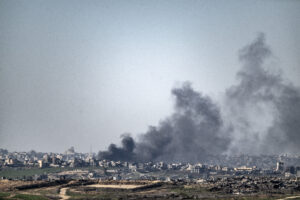EU lawmakers condemn use of violence against Ukrainian women as ‘weapon of war’
BRUSSELS/ANKARA – The European Parliament has condemned Russian forces for using violence against women as a “weapon of war” in Ukraine, and urged EU countries to provide extra protection for women refugees at risk of abuse and trafficking.
In a resolution adopted by 462 votes in favor, 19 against and 89 abstentions, the parliament “strongly condemn(ed) the use of sexual and gender-based violence as a weapon of war,” read a statement.
EU lawmakers pointed out that over 90% of refugees are women and children, expressing “deep concern” over reports of “sexual violence, exploitation, rape and abuse.”
“There is an increasing number of unofficial reports from survivors, but also intelligence reports, about sexual violence in the conflict; whereas there are growing reports that rape, sexual harassment, torture, mass executions and genocide are being increasingly used by the Russian army as weapons of war against the civilian population in Ukraine,” according to the statement.
The lawmakers called on EU member states to take measures to address the specific needs of women and provide them safe transportation.
They also urged host and transit countries to provide access to proper medical care, “particularly emergency contraception and abortion care, including for victims of rape, as well as obstetric care.”
Earlier, in her speech at a plenary session, EU Commissioner for Home Affairs Ylva Johansson called for investigation of the crimes. “We must leave no stone unturned to punish the perpetrators,” she said. “The EU supports investigations by the Ukrainian authorities, the member states and the International Criminal Court.”
Tighter transport sanctions
In a separate resolution, the European Parliament asked EU countries to tighten transport sanctions, barring all Russian ships from entering and refueling at European ports.
It also called on Russia to restitute to the original owners planes forcibly registered as Russian.
“Such a theft cannot be tolerated,” they said, terming Russia’s measures a “clear breach of international aviation rules.”









